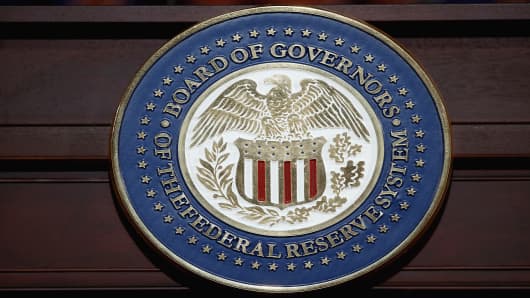A realization that the global financial crisis is far from over threatens to leave Federal Reserve interest rate policy on hold indefinitely, much to the discomfort of inflation-wary central bankers.
Strategists were surprised by an about-face on Tuesday when Fed Chairman Ben Bernanke suggested the Fed's immediate focus is to stabilize financial conditions, not tamp down inflation.
The straw that broke the camel's back apparently came over the weekend, with another round of emergency meetings at the Fed and Treasury that cooked up a rescue plan for troubled mortgage finance giants Fannie Mae and Freddie Mac .
"Bernanke's Humphrey-Hawkins testimony was likely written weeks ago and hastily rewritten between crisis-control meetings," said Chris Low, chief economist at FTN Financial in New York.
Even as the need for financial stability has marched back onto center stage, and as some U.S. lawmakers start to push for a second round of stimulus for the stagnant economy, inflation pressures are racing ahead at full tilt.
The consumer price index, the most closely-followed measure of U.S. inflation, rose by 5 percent in the year through June, the fastest advance since 1991.
Many strategists have been eyeing 5 percent or a shade higher as a possible "summer driving season" peak for CPI.
It remains to be seen whether June marked an inflection point or just a staging post to even higher levels, but still highlighted the Fed's bind.
"The Fed is not going to be able to lower interest rates if the economy remains weak. And as long as the economy remains weak, it will be hard for the Fed to raise rates to fight inflation," said Gary Thayer, senior economist at Wachovia Securities in St. Louis, Missouri.
Et Tu Ben?
In his testimony, Bernanke backtracked on the notion, contained in the June 25 Federal Open Market Committee statement, that downside risks to growth "appear to have diminished somewhat."
"The possibility of higher energy prices, tighter credit conditions and a still-deeper contraction in housing markets all represent significant risks to the outlook for growth," the chairman said.
Bernanke also said that "helping the financial markets to return to more normal functioning will continue to be a top priority" as a prerequisite for healthy economic growth.
Analysts said the ground has shifted rapidly and inexorably under the Fed, culminating in last week's crisis at Fannie Mae and Freddie Mac that drove down share prices at the government-sponsored enterprises.
"Things changed in the last three weeks since the last FOMC meeting," said Brian Fabbri, economist at BNP Paribas, referring to the Fed's policy-setting Federal Open Market Committee.
"Since then, economic data proved adverse, stock prices depreciated and the GSEs came under attack."
As a result, financial markets have wrung out almost all expectations for the Fed to tighten monetary policy for the rest of 2008, even as some Fed officials have called for a rapid strike against inflation.
"Policymakers are uncomfortably on hold," Deutsche Bank economists Joseph LaVorgna and Carl Riccadonna said in a research note.
Derivatives markets now imply a year-end fed funds rate of 2.19 percent, versus 2.58 percent indicated on June 25, and 2.78 percent on June 10, the day after Bernanke gave a fiery anti-inflation speech at a Boston Fed conference.
"A month ago, Bernanke was a man of action, promising to do something if necessary," said Stephen Stanley, chief economist at RBS Greenwich Capital in Greenwich, Connecticut.
Now, "he is speaking in passive voice ... those who are worried about the Fed's inflation-fighting resolve are likely going to be less than reassured."
Bernanke flapped a more hawkish wing on Wednesday, telling the House Financial Services Committee that bringing down inflation is a top priority. Many doubt, though, that the Fed can do more than talk about inflation at this point.
Markdowns
A recent decline in the U.S. stock market to bear-market territory suggested investors never bought into the Fed's cautiously upbeat views, and Bernanke's change of heart more closely mirrors a downward tilt in the earnings outlook.
Second-quarter earnings for S&P 500 firms were forecast at the end of May to fall by 7.7 percent year-on-year. That estimate was cut to down 10.8 percent at the time of the FOMC meeting, and is now at down 15.1 percent, according to Thomson Reuters Research.
In contrast, the Fed barely tinkered with its June central tendency forecasts for the U.S. economy, which were released on Tuesday to coincide with Bernanke's appearance on the Hill.
U.S. economic growth for 2008 was actually revised up, to a range of 1.0 to 1.6 percent from a range of 0.3 to 1.2 percent in April. For 2009, real gross domestic product growth forecasts were left unchanged from April in a range of 2.0 to 2.8 percent.
Analysts guessed that the forecasts, gleaned ahead of the June FOMC meeting, might also be subject to revision.


